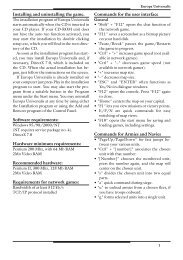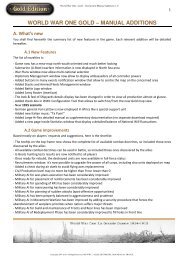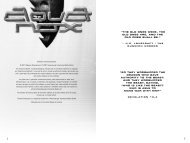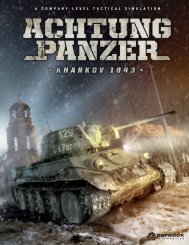You also want an ePaper? Increase the reach of your titles
YUMPU automatically turns print PDFs into web optimized ePapers that Google loves.
During an “ordinary” battle, with 2<br />
Armies, command goes to the general<br />
with the better rank (the letter closest<br />
to A).<br />
Numerical Superiority<br />
If the Attacker has at least 3 corps more<br />
than his opponent, he benefits from a<br />
“numerical advantage” for the battle: +1<br />
bonus in his favor.<br />
If the Defender has the numerical<br />
advantage, the Attacker suffers a -1<br />
penalty.<br />
This is calculated without counting the<br />
HQ’s reserve units. In the case of the major battle, no one may have<br />
numerical superiority as long as a sub-battle has not been won.<br />
Superiority may be acquired or lost during combat, and thus in the same<br />
way, the bonus/negative effect that goes with it.<br />
Doctrine Differential<br />
The Defender under Firepower Doctrine inflicts a -1 penaltye effect on the<br />
Attacker if he is still under the Movement Warfare Doctrine.<br />
Winter<br />
Snow gives a -1 penalty to all attacks.<br />
Events<br />
Certain events give a variable bonus, depending on the event played. Only<br />
one event per side may be played to affect a given battle.<br />
Marine Units Advantage<br />
A marine unit (with an anchor symbol) has an elite morale only in coastal<br />
regions. Elsewhere, his morale is only veteran.<br />
When a marine unit is engaged in combat in a coastal region (attacking<br />
or defending), no matter what the terrain is, the firepower value of the<br />
opponent’s unit is ignored.<br />
This only applies to the round of battle when the said marine unit is itself<br />
engaged.<br />
Mountain Units Advantage<br />
When it is engaged in combat in a mountain or high mountain region,<br />
attacking or defending, the firepower value of the opponent’s unit is<br />
ignored.<br />
This only applies to the round of battle when the said mountain unit is itself<br />
engaged.<br />
Siberians Advantage<br />
The three Siberian 5 1 -6-4 [E] Russian corps have an elite morale only in<br />
Snow. Otherwise, in Good weather or rain, they only have veteran morale.<br />
11.3.4 Combat Results<br />
Combat losses are expressed in the number of losses sustained by the<br />
Attacker and the Defender. These losses are applied immediately.<br />
Loss Principle<br />
A standard corps has two steps: the first represents the unit’s full strength,<br />
the second, illustrated by a white stripe on the unit’s picture, is the<br />
“damaged” step (1 loss has been sustained).<br />
A corps may sustain 1 loss without a problem. The unit is simply reduced<br />
and now shows its white stripe.<br />
From the 2nd loss sustained, the unit uses 1 RP from the country’s stock<br />
to maintain itself and must roll a “morale check”. This check results<br />
indicates further effects that, in general, harms the unit for a time. A unit<br />
may sometimes last for several rounds as long as it passes the moral<br />
checks and uses RP.<br />
Numerical Losses<br />
There are losses if the combat result table indicates a number (½, 1 or 2)<br />
or a letter (“M” or “E”).<br />
Losses are automatically registered and accumulated from all the battles<br />
conducted by the same nation during the current turn. This will be<br />
important for the country’s National Will (and certain special rules in the<br />
scenario) at the end of each turn, starting from the end of September 1914.<br />
World War One: La Grande Guerre 1914-1918 45
















